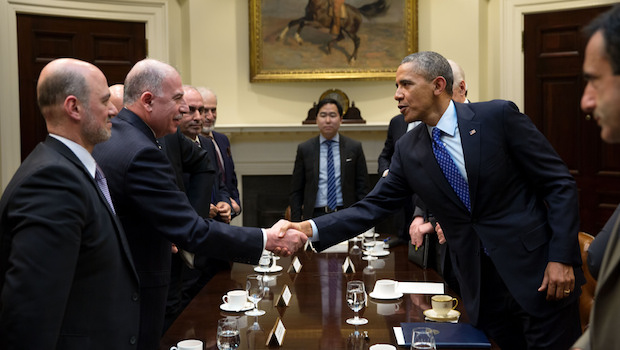
President Barack Obama greets Speaker Osama Al-Nujaifi in the Roosevelt Room of the White House on January 22, 2014. (White House/Pete Souza)
Baghdad, Asharq Al-Awsat—A recent visit by Iraqi Parliament Speak Osama Al-Nujaifi to Washington, which included meetings with President Barack Obama and Vice President Joe Biden to discuss the Anbar crisis and their mutual efforts to fight terrorism, has met with controversy in Iraq.
In exclusive comments to Asharq Al-Awsat following the high-level meetings on Wednesday, Jamal Al-Bateekh, the head of the White Iraqiya Coalition aligned with Prime Minister Nuri Al-Maliki’s State of Law coalition, hit out at Nujaifi for “reducing the Iraqi Parliament to his person and his bloc by representing partisan and factional, rather than national issues, as is expected of someone in his position.”
According to Bateekh, Nujaifi is trying to promote the idea that it is the tribes in Anbar that are fighting terrorism, rather than government forces. He blamed the speaker for the deteriorating situation in the province.
Bateekh also slammed Deputy Prime Minister Saleh Al-Mutlaq for “pushing the US towards refraining from arming the Iraqi military,” accusing him of collaborating with Nujaifi, whose main interest, Bateekh said, was “to integrate tribal militias into the army in a bid to achieve some sort of balance.”
In exclusive comments to Asharq Al-Awsat parliamentary rapporteur Mohamed Al-Khaledi defended the visit by saying that Nujaifi went to the US “in his official capacity as a the Speaker of the Iraqi Parliament. The talks he held with senior US officials covered mutual affairs and concerns, particularly the war on terror and the importance of US support of the Iraqi military and security forces.”
Following the meeting in Washington, Nujaifi’s Mutahidoun Coalition issued a statement confirming the US President “showed his country’s readiness to step up cooperation with Iraq and provide all kinds of support in its war on terror.”
Among the options discussed during the bilateral meetings was the integration of the tribal forces fighting the Al-Qaeda-linked Islamic State of Iraq and Syria (ISIS) in Anbar into the government armed forces.
Currently, the predominately Shi’ite government in Baghdad is relying on tribespeople and other local forces to combat Al-Qaeda in the predominately Sunni Anbar governorate.
Anbar was a stronghold for both Al-Qaeda and Saddam Hussein in the years after the US invaded Iraq in 2003, and it was also the governorate in which the most US troops were killed during the conflict.
